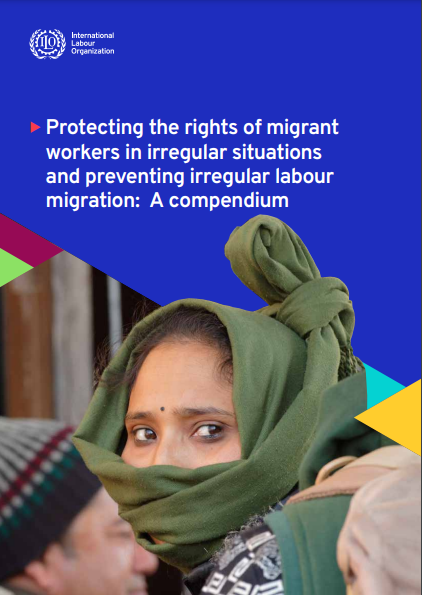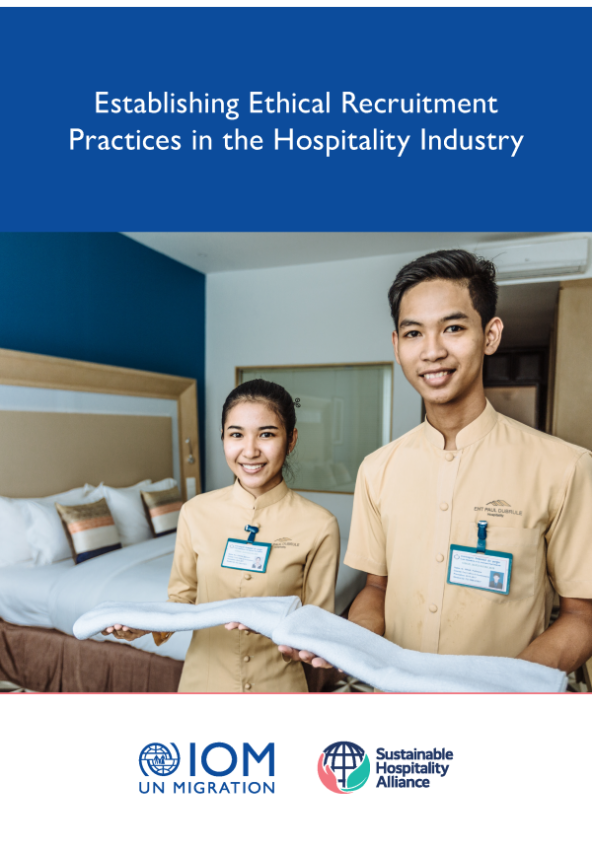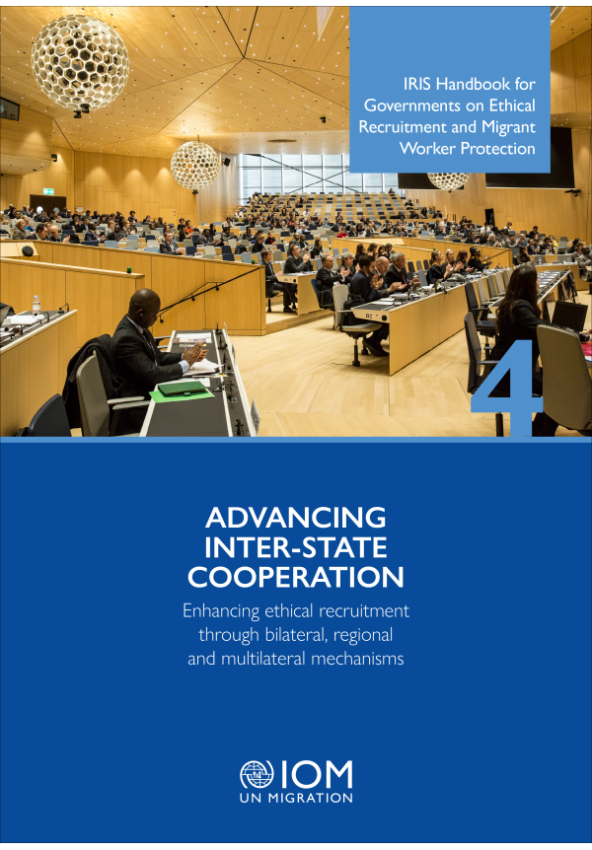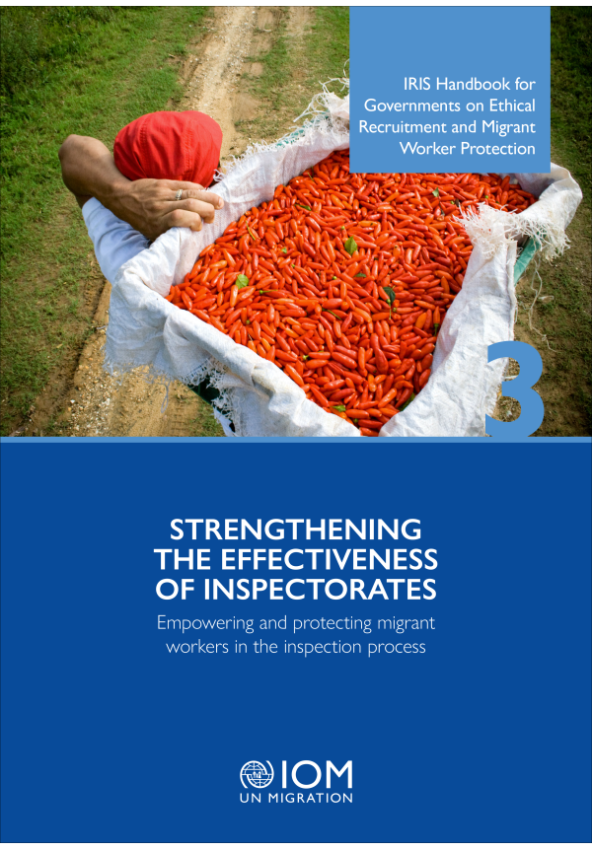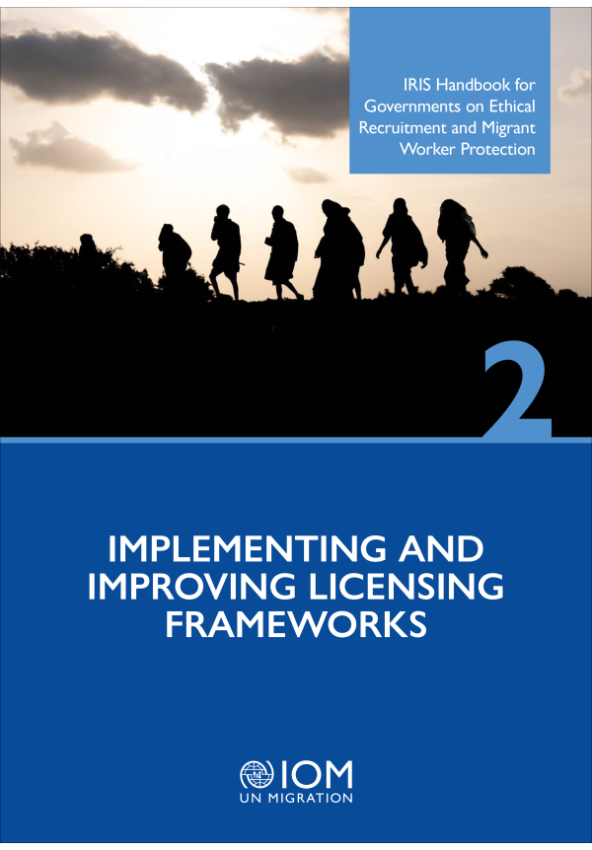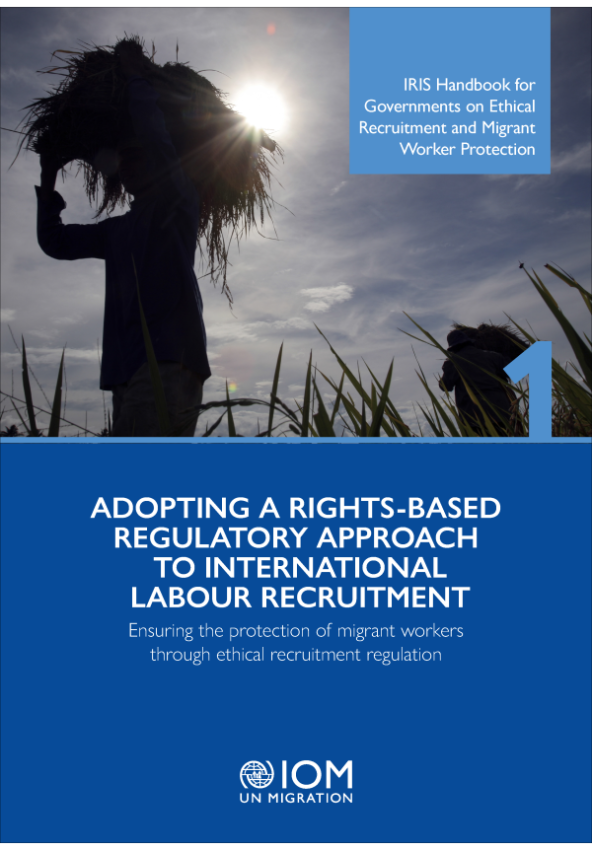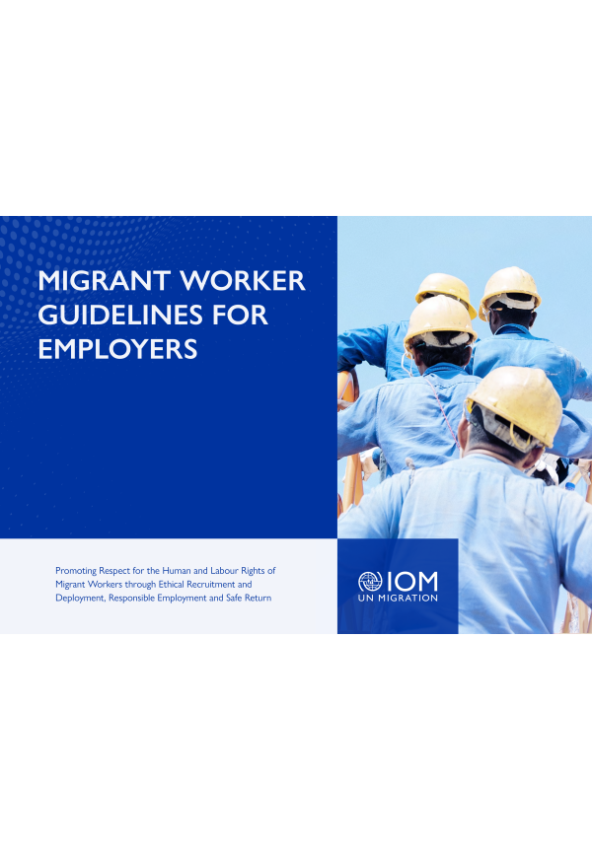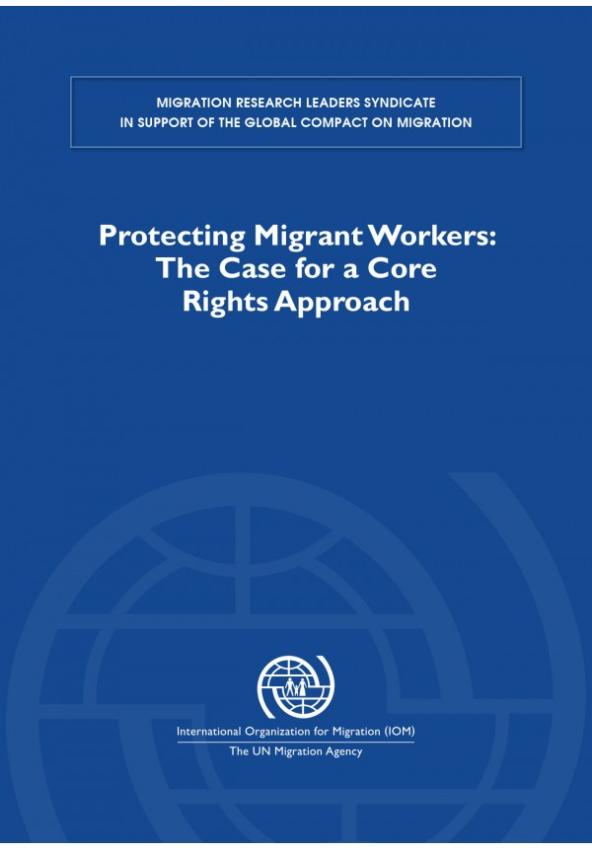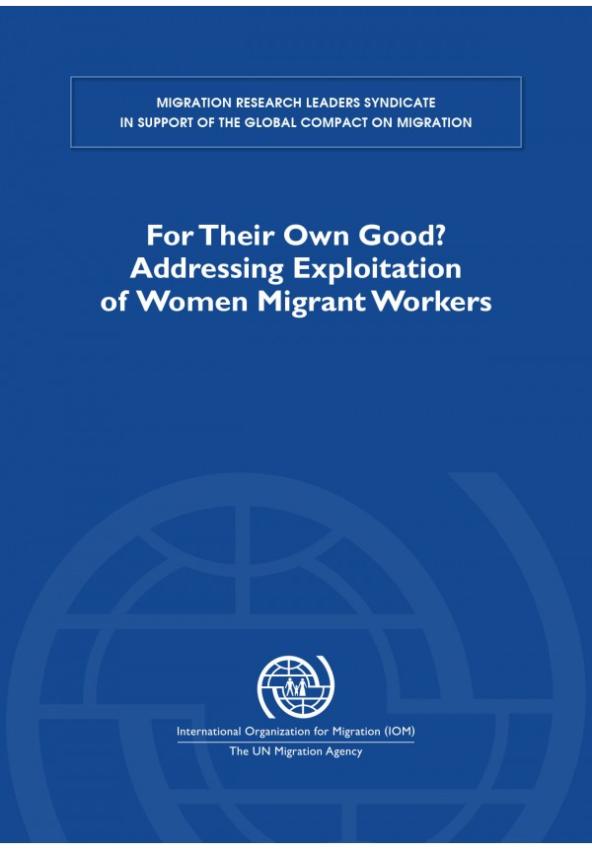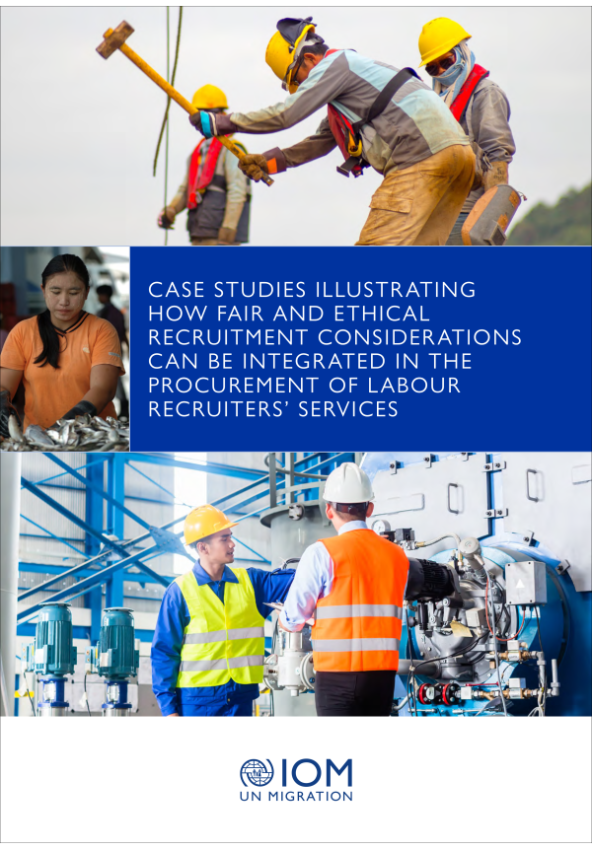Protecting the Rights of Migrant Workers in an Irregular Situation and Preventing Irregular Labour Migration: A Compendium
The Compendium presents the situations that can lead migrant workers into irregularity, the rights of migrant workers in irregular situations, and the relevant international standards and good practice. It highlights laws, policies and practices that can help prevent irregular labour migration, and facilitate respect and promotion of the human rights of all migrant workers, regardless of status”. The Compendium is not intended to be exhaustive but is instead a living document that will be regularly updated with new examples and experiences. It seeks to encourage the sharing of good practices by states, social partners, and other actors concerned and to contribute to the attainment of the objectives of the Global Compact for Safe, Orderly and Regular migration.
Some of the references will be further updated in early 2022.
Type of document :
Country/Region :
Year of publication :
Theme : , , , ,
Establishing Ethical Recruitment Practices in the Hospitality Industry
This document provides practical guidance for the hospitality industry on how to ethically recruit international migrant workers within business enterprise operations and supply chains. It has been developed by IOM in partnership with the Sustainable Hospitality Alliance.
This guidance aligns with ethical recruitment principles from IOM’s IRIS Ethical Recruitment initiative and the IRIS Standard, which is a global, multi-stakeholder standard that defines and establishes an operational benchmark for ethical recruitment. It is also closely aligned with the Sustainable Hospitality Alliance’s Principles on Forced Labour: (a) every worker should have freedom of movement; (b) no worker should pay for a job; and (c) no worker should be indebted or forced to work.
This guidance is global in nature and designed primarily for hotels. It is applicable to both multinational enterprises and small- and medium-sized enterprises. It can also serve as a resource for other tourism-related industries, as the principles of ethical recruitment are universal.
Guidance Notes and Tools
Guidance Note A: Establishing Ethical Recruitment Practices in the Hospitality Industry
Guidance Note B: Building the knowledge and capacity of hotels to implement ethical recruitment
Guidance Note C: Working with civil society and including migrant worker voice
Tool 1: Working with labour recruiters and employment agencies
Tool 2: Interviewing migrant workers about their recruitment and employment experiences
Tool 3: Incorporating ethical recruitment into procurement practices
Tool 4: Access to remedy and business grievance mechanisms
Tool 5: Frequently asked questions about migrant workers and recruitment
Type of document :
Country/Region :
Year of publication :
Theme : , , , ,
IRIS Handbook for Governments on Ethical Recruitment and Migrant Worker Protection: Chapter 4 – Advancing inter-State cooperation
This resource is the fourth chapter of the IRIS Handbook for Governments on Ethical Recruitment and Migrant Worker Protection. With direct relevance to inter-State labour migration governance mechanisms and processes, it provides governments with practical guidance on how to integrate, mainstream and prioritize ethical recruitment in these cooperative activities.
The chapter covers a broad range of relevant topics including: the value and benefits of inter-State cooperation in international labour recruitment governance; the landscape of relevant labour migration mechanisms and processes (including labour migration agreements and inter-State consultation mechanisms); and specific guidance and examples of how to advance and prioritize ethical recruitment in these endeavours. Guidance is intended for government officials in their capacities as negotiators, regulators, inspectors, labour attachés and consular officials at different levels of administration (national, subnational) and across relevant portfolios (labour and employment, migration, foreign affairs, etc.).
The IRIS Handbook is IOM’s flagship global guidance tool for governments on ethical recruitment and migrant worker protection. It builds directly on the Montreal Recommendations on Recruitment: A Road Map towards Better Regulation with more detailed measures for consideration, and profiles relevant concrete actions that governments around the world have taken.
Type of document :
Country/Region :
Year of publication :
Theme : , , ,
IRIS Handbook for Governments on Ethical Recruitment and Migrant Worker Protection: Chapter 3 – Strengthening the effectiveness of inspectorates
This resource is the third chapter of the IRIS Handbook for Governments on Ethical Recruitment and Migrant Worker Protection. It provides governments with practical guidance on how to strengthen the effectiveness of inspectorates to ensure that migrant workers are empowered and protected during the inspection process.
The chapter covers a broad range of relevant topics including setting up an effective inspectorate in law and practice (legal framework, monitoring and enforcement strategy, resources, process and decision-making, collaborative approaches) and migrant-sensitive inspection approaches and methods (facilitative conditions for migrant workers, inspection modalities, interview techniques). Guidance is intended for government officials in their capacities as inspectors at various levels of administration (national, subnational) and across relevant portfolios (labour, migration, consumer protection, etc.). It can be applied in countries of origin, transit and destination.
The IRIS Handbook is IOM’s flagship global guidance tool for governments on ethical recruitment and migrant worker protection. It builds directly on the Montreal Recommendations on Recruitment: A Road Map towards Better Regulation with more detailed measures for consideration, and profiles relevant concrete actions that governments around the world have taken.
Type of document :
Country/Region :
Year of publication :
Theme : , , ,
IRIS Handbook for Governments on Ethical Recruitment and Migrant Worker Protection: Chapter 2 – Implementing and improving licensing frameworks
This resource is the second chapter of the IRIS Handbook for Governments on Ethical Recruitment and Migrant Worker Protection. It provides governments with practical guidance on how to implement and improve the administration of private international labour recruiter frameworks, with an emphasis on ensuring recruiters are competent in and accountable to ethical recruitment principles.
The chapter covers a broad range of relevant topics including: knowledge of ethical recruitment standards (information and educational options); licence application and assessment (screening process, eligibility and requirements); licence features and conditions; and accountability measures (oversight and transparency). Guidance is intended for government officials in their capacities as regulators and inspectorates of private labour recruiters at various levels of administration (national, subnational) and across relevant portfolios (labour, immigration, consumer protection, etc.). It can be applied in countries of origin, transit and destination.
The IRIS Handbook is IOM’s flagship global guidance tool for governments on ethical recruitment and migrant worker protection. It builds directly on the Montreal Recommendations on Recruitment: A Road Map towards Better Regulation with more detailed measures for consideration, and profiles relevant concrete actions that governments around the world have taken.
Type of document :
Country/Region :
Year of publication :
Theme : , , , , ,
IRIS Handbook for Governments on Ethical Recruitment and Migrant Worker Protection: Chapter 1 - Adopting a rights-based regulatory approach to international labour recruitment
This resource is the first chapter of the IRIS Handbook for Governments on Ethical Recruitment and Migrant Worker Protection. It provides governments with practical guidance on how to adopt and strengthen a rights-based framework to regulate private international labour recruiters and uphold migrant worker protection. The chapter covers a comprehensive range of themes including: regulatory measures (key definitions and terms, legal status of labour recruiters, ethical rules of conduct); enforcement and oversight (mandating authorities and sanctions); and access to justice (complaint mechanisms and complementary measures). Guidance is intended for government officials in their capacities as policymakers and regulators at various levels of administration (national, subnational) and across relevant portfolios (immigration, labour, foreign affairs, etc.). It can be applied in countries of origin, transit and destination.
The IRIS Handbook is IOM’s flagship global guidance tool for governments on ethical recruitment and migrant worker protection. It builds directly on the Montreal Recommendations on Recruitment: A Road Map towards Better Regulation with more detailed measures for consideration, and profiles relevant concrete actions that governments around the world have taken.
Type of document :
Country/Region :
Year of publication :
Theme : , , , ,
Migrant Worker Guidelines for Employers
This publication is to provide practical guidance for business enterprises on how to recruit and employ international migrant workers ethically and responsibly. The guidance offers concrete steps employers across various sectors can take to run their businesses in a manner that respects human and labour rights of migrant workers. The guidance is primarily for human resources and personnel engaged with migrant workers and can be integrated in existing company policies, procedures and practices.
The guidance builds on the United Nations Guiding Principles on Business and Human Rights (UNGP) and relevant international human rights and labour standards and frameworks on international migration. It has been developed as part of the IOM’s Corporate Responsibility in Eliminating Slavery and Trafficking (CREST) initiative, through an extensive multi-stakeholder consultation process.
The guidance is accompanied by a set of supporting tools including checklists, guidance notes and other useful documents, to help employers develop and implement the system, principles and practices to manage the labour migration process.
Supporting tools
- Summary - Common challenges and Risks Experienced by Migrant Workers at All Stages of Labour Migration
- Checklist - Labour Recruiter Service Agreements
- Guidance Note - Recruitment Fees and Related Costs
- Checklist - Employment Contracts
- Checklist - Migrant Workers' Accommodations
Type of document :
Country/Region :
Year of publication :
Theme : , , , , ,
Protecting Migrant Workers: The Case for a Core Rights Approach
This paper is part of the IOM Migration Research Leaders Syndicate’s contribution toward the Global Compact for Migration. It is one of 26 papers that make up a consolidated Syndicate publication, which focuses on proposing ways to address complex and pressing issues in contemporary international migration. The Migration Research Leaders Syndicate, convened as part of IOM’s efforts to extend policy and technical expertise in support of the Global Compact for Migration, comprises senior researchers from diverse geographic, disciplinary and thematic backgrounds. The Syndicate provides a channel for leading experts in migration to propose ideas to meet the ambitious goals outlined in the New York Declaration for Refugees and Migrants of September 2016.
In technical papers such as this one, Syndicate members were invited to identify and propose ways to resolve key conundrums currently posing challenges to international migration governance. To hone their proposals, they benefited from the input of advisors with experience in bridging policy and research, whether as senior non-migration scholars, former policy makers or prominent practitioners. The papers are short and crisp contributions that provide evidence-based, innovative ideas to improve international cooperation on fostering safe, orderly and regular migration.
Type of document :
Country/Region :
Year of publication :
Theme :
For Their Own Good? Addressing Exploitation of Women Migrant Workers
This paper is part of the IOM Migration Research Leaders Syndicate’s contribution toward the Global Compact for Migration. It is one of 26 papers that make up a consolidated Syndicate publication, which focuses on proposing ways to address complex and pressing issues in contemporary international migration. The Migration Research Leaders Syndicate, convened as part of IOM’s efforts to extend policy and technical expertise in support of the Global Compact for Migration, comprises senior researchers from diverse geographic, disciplinary and thematic backgrounds. The Syndicate provides a channel for leading experts in migration to propose ideas to meet the ambitious goals outlined in the New York Declaration for Refugees and Migrants of September 2016.
In technical papers such as this one, Syndicate members were invited to identify and propose ways to resolve key conundrums currently posing challenges to international migration governance. To hone their proposals, they benefited from the input of advisors with experience in bridging policy and research, whether as senior non-migration scholars, former policy makers or prominent practitioners. The papers are short and crisp contributions that provide evidence-based, innovative ideas to improve international cooperation on fostering safe, orderly and regular migration.
Type of document :
Country/Region :
Year of publication :
Theme : , ,
Case Studies Illustrating How Fair and Ethical Recruitment Considerations Can Be Integrated in the Procurement of Labour Recruiters’ Services
Although present literature provides guidance on fair and ethical recruitment, there is a lack of attention on how the procurement of labour recruiters’ services can be leveraged to prevent forced labour and exploitation in global supply chains. Labour recruiters have been essential not only in meeting the global demand for migrant labour, but also in ensuring the rights of migrant workers and upholding fair and ethical recruitment principles. This study focuses on the procurement process as an early step in managing forced labour risks for migrant workers when engaging with labour recruiters.
To provide practical examples on improving procurement practices and integrating fair and ethical recruitment standards in the supply chain management of business enterprises, this research uses case studies, key informant interviews, and desk reviews to identify common challenges and barriers to the adoption of ethical procurement practices.
The identified challenges and successes from actual cases further guide the recommendations to mainstream ethical recruitment in the procurement of labour recruiters’ services. In line with IOM’s mission, this study provides a strong foundation for building the case for labour recruiters to fulfill their responsibility to respect migrant workers’ rights.
Type of document :
Country/Region :
Year of publication :
Theme : , ,
Subscribe to the Fair Recruitment Initiative Newsletter
Sign up to receive news delivered to your inbox.

